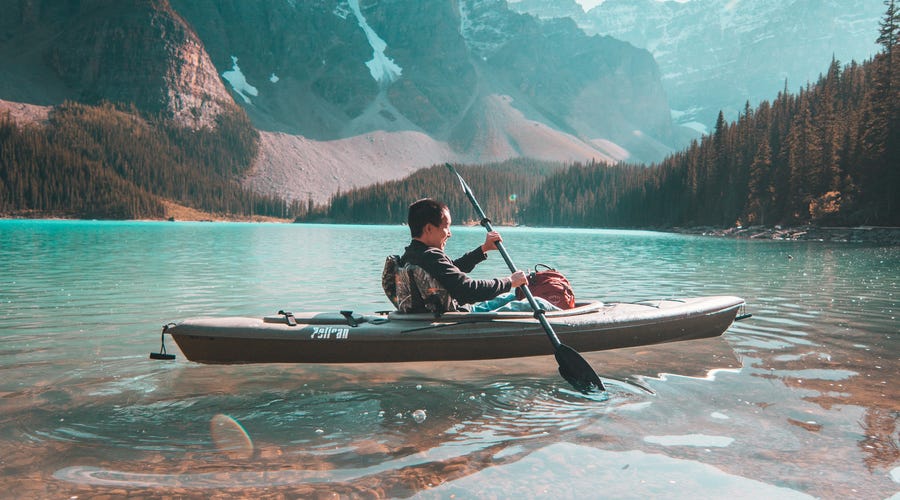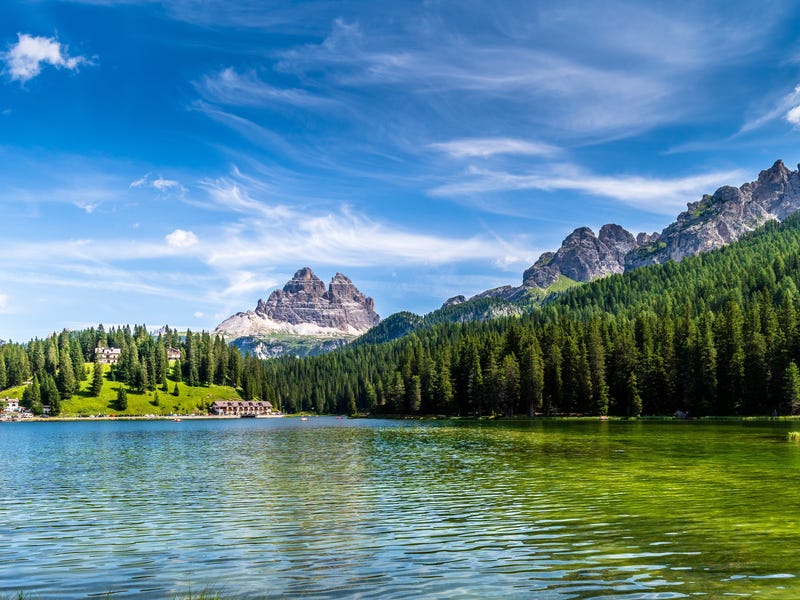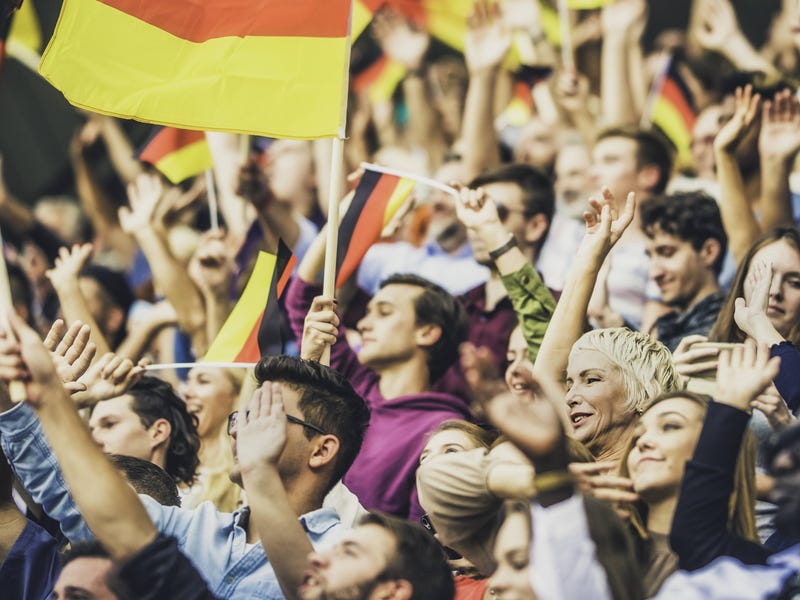Sports are a fun way to connect to people from all around the world.
When you’re moving your body while playing soccer or going for a jog with a German-speaking friend, language learning automatically feels easy and natural.
For a new German-learner, there’s nothing like striking up a soccer match to make German friends! Or starting a conversation about any other sport - this can be basketball, equestrian vaulting or a boxing match.
Especially if you find yourself in a German-speaking country, some of the best ways to practice your German are sports-related:
- Ask a German–speaker about their favorite sports to get to know them better
- Experience a huge part of the German culture by going to a soccer match in the stadium and singing along to some Fußball chants
- Watch sports on German tv and listen closely to the commentator
- Take up a team sport and blend in with your German-speaking team mates
How do you say “sports” in German
“Sports” in German is “Sport”. While it’s a plural word in English, it’s a singular-only word in German. If you’re referring to different kinds of sports, you say “Sportarten”.
There’s an abundance of these - from golf and tennis to swimming and horse-back riding. So we’ll teach you about the most popular ones and how to say them in German.
How to talk about sports in German
Striking up a conversation about sports can be as simple as asking someone what sports they play or like to watch on tv. Start with these basics.

Machst du Sport?
English: Do you workout?
Was ist dein Lieblingssport?
English: What’s your favorite sport?
Magst du Mannschaftssportarten?
English: Do you like team sports?
Try to find common ground through shared interests. You can bond over your love for a specific sport, a famous team or even over a mutual aversion for sports altogether!
Ich interessiere mich für Tennis.
English: I’m into tennis.
Ich bin ein Fan von Borussia Dortmund.
English: I’m a fan of Borussia Dortmund.
Ich mag keinen Sport!
English: I don’t like sports!
Sport-related verbs
Sports are all about movement and being active, so verbs are especially important when you want to talk about them.
| English | German | IPA |
| To play | Spielen | [ˈʃpiːlən] |
| To do sports | Sport machen; Sport treiben | [ʃpɔʁt ˈmaxn; ʃpɔʁt ˈtʁaɪ̯bn̩] |
| To practice | Üben | [ˈyːbn] |
| To workout | Trainieren | [tʁɛˈniːʁən] |
| To train for the Olympics | Für Olympia trainieren | [fyːɐ̯ oˈlʏmpi̯a tʁɛˈniːʁən] |
| To score | Punkten | [ˈpʊŋktn̩] |
| To win | Gewinnen | [ɡəˈvɪnən] |
| To beat | Schlagen | [ˈʃlaːɡn̩] |
| To tie | Remis spielen | [ʁəˈmiː ˈʃpiːlən] |
| To cheat | Betrügen | [bəˈtʁyːɡn̩] |
| To lose | Verlieren | [fɛɐ̯ˈliːʁən] |
| To draw | Unentschieden spielen | [ˈʊnʔɛntˌʃiːdn̩ ˈʃpiːlən] |
| To dribble | Dribbeln | [ˈdʁɪbl̩n] |
| To bounce | Prellen | [ˈpʁɛlən] |
| To take part | Teilnehmen | [ˈtaɪ̯lˌneːmən] |
List of sports in German
The good thing when you’re learning about sports in German is that the German words are often the same or at least very similar.
American Football in German is “Football”, basketball in German is “Basketball” and volleyball in German is “Volleyball”. Easy enough, right?
Outdoor sports
When it comes to outdoor sports, which we call “Outdoor Sport” or more formally “Freiluftsport”, Germany is all about soccer!
Of course we call it “Fußball” since you hit the Ball with your Fuß and that’s just how logical the German language is.

| English | German | IPA |
| Soccer | Fußball | [ˈfuːsˌbal] |
| American football | Football | [ˈfʊtbɔːl] |
| Outdoor basketball | Basketball | [ˈbaːskətˌbal] |
| Baseball | Baseball | [ˈbɛɪ̯sbɔːl] |
| Golf | Golf | [ɡɔlf] |
| Road cycling | Straßenradfahren | [ˈʃtʁaːsn̩ˈʁaːtˌfaːʁən] |
| Tennis | Tennis | [ˈtɛnɪs] |
| Hiking | Wandern | [ˈvandɐn] |
| Mountain biking | Mountainbikefahren | [ˈmaʊ̯ntɪnˌbaɪ̯kˈfaːʁən] |
| Rock climbing | Felsenklettern | [ˈfɛlzn̩ˈklɛtɐn] |
| Badminton | Badminton; Federball | [ˈbɛtmɪntn̩; ˈfeːdɐˌbal] |
| Archery | Bogenschießen | [ˈboːɡn̩ˌʃiːsn̩] |
| Parkour | Parkour | [paʁˈkuːɐ̯] |
| BMXing | BMXen | [beɛmiksn] |
| Skateboarding | Skateboarden | [ˈskɛɪ̯tboːɐ̯tn] |
| Snowboarding | Snowboarden | [ˈsnoːˌboːɐ̯dn̩] |
| Skiing | Ski | [ʃiː] |
| Frisbee | Frisbee | [ˈfʁɪsbi] |
| Horse riding | Reiten | [ˈʁaɪ̯tn̩] |
| Polo | Polo | [ˈpoːlo] |
| Dressage | Dressurreiten | [dʁɛˈsuːɐ̯ˌʁaɪ̯tn̩] |
| Rugby | Rugby | [ˈʁakbi] |
| Cricket | Cricket | [ˈkʁɪkət] |
| Beach volleyball | Beachvolleyball | [ˈbiːtʃtˌvɔlibal] |
| Paragliding | Paragleiten | [ˈpaʁaˌɡlaɪ̯tn] |
| Track and Field | Leichtathletik | [ˈlaɪ̯çtʔatˌleːtik] |
| Running | Laufen | [ˈlaʊ̯fn̩] |
| Sprint | Sprint | [ʃpʁɪnt] |
| Jogging | Joggen | [ˈdʒɔɡn] |
| Marathon | Marathon | [ˈmaːʁatɔn] |
| High jump | Hochsprung | [ˈhoːxˌʃpʁʊŋ] |
| Long jump | Weitsprung | [ˈvaɪ̯tʃpʁʊŋ] |
| Discus throw | Diskuswurf | [ˈdɪskʊsˌvʊʁf] |
| Hammer throw | Hammerwerfen | [ˈhamɐˌvɛʁfn̩] |
| Javelin throw | Speerwurf | [ˈʃpeːɐ̯ˌvʊʁf] |
Water sports
“Water sports” in German are “Wassersportarten” (vah-sa-shport-art-en). Some of the most popular ones are swimming, surfing, kiteboating and kayaking - and if you enjoy scuba diving, you should definitely try it in one of the crystal clear Alpine lakes in Germany, Austria or Switzerland!

| English | German | IPA |
| Swimming | Schwimmen | [ˈʃvɪmən] |
| Freestyle | Freestyle | [fʁistajl] |
| Backstroke | Rückenschwimmen | [ˈʁʏkn̩ˌʃvɪmɐ] |
| Butterfly | Schmetterling | [ˈʃmɛtɐlɪŋ] |
| Breaststroke | Brustschwimmen | [ˈbʁʊstˌʃvɪmən] |
| Diving | Tauchen | [ˈtaʊ̯xn̩] |
| Water polo | Wasserball | [ˈvasɐˌbal] |
| Synchronized swimming | Synchronschwimmen | [zʏnˈkʁoːnˌʃvɪmən] |
| Bodyboarding | Bodyboarding | [ˈbɒdɪbɔʁdˈiŋɡ] |
| Surfing | Surfen | [ˈsœːɐ̯fn̩] |
| Windsurfing | Windsurfen | [ˈvɪntˌsœːɐ̯fɐn] |
| Wakeboarding | Wakeboarden | [ˈvɛɪ̯kˌbɔːɐ̯tn̩] |
| Waterskiing | Wasserskilaufen | [ˈvasɐʃiːˌˈlaʊ̯fn̩] |
| Kayaking | Kajaken | [ˈkaːjakn] |
| Canyoning | Canyoning | [kanjɔniŋ] |
| Snorkeling | Schnorcheln | [ˈʃnɔʁçl̩n] |
| Sailing | Segeln | [ˈzeːɡl̩n] |
| Rowing | Rudern | [ˈʁuːdɐn] |
| Paddleboarding | Paddeln | [ˈpadln] |
| Rafting | Rafting | [ˈʁaːftɪŋ] |
Indoor sports
Many indoor sports (Hallensport) are the same in German as they are in English. So people will understand you perfectly, whether you mention “yoga”, “pilates”, “boxing” or any kind of dance - from foxtrot to hip hop.

| English | German | IPA |
| Indoor soccer | Hallenfußball | [ˈhalənˌfuːsbal] |
| Ice skating | Schlittschuhlaufen | [ˈʃlɪtˌʃuːˌlaʊ̯fn̩] |
| Squash | Squash | [skvɔʃ] |
| Pilates | Pilates | [pi:ˈlatəs ] |
| Yoga | Yoga | [ˈjoːɡa] |
| Volleyball | Volleyball | [ˈvɔlɛɪ̯ˌbal] |
| Basketball | Basketball | [ˈbaːskətˌbal] |
| Softball | Softball | [sɔftbol] |
| Table tennis | Tischtennis | [ˈtɪʃˌtɛnɪs] |
| Indoor cycling | Indoor-Radfahren | [ɪndo:ɐ̯ ˈʁaːtˌfaːʁən] |
| Wrestling | Wrestling | [ˈʁɛslɪŋ] |
| Gymnastics | Gymnastik; Turnen | [ˌɡʏmˈnastɪk; ˈtʊʁnən] |
| Karate | Karate | [kaˈʁaːtə] |
| Judo | Judo | [ˈjuːdo] |
| Fencing | Fechten | [ˈfɛçtn̩] |
| Boxing | Boxen | [ˈbɔksn̩] |
| Kickboxing | Kickboxen | [ˈkɪkˌbɔksn̩] |
| Capoeira | Capoeira | [kapoˈeːʁa] |
| Dance | Tanz | [tants] |
Other games in German
Not all sports need a lot of action! There’s a German word referring to mental exercises called “Denksport” (Think-sports). This includes activities like chess, card games and board games.
| English | German | IPA |
| Card games | Kartenspiele | [ˈkaʁtn̩ˌʃpiːlə] |
| Board games | Brettspiele | [ˈbʁɛtˌʃpiːlə] |
| Video games | Videospiele | [ˈviːdeoˌʃpiːlə] |
| Drinking games | Trinkspiele | [ˈtʁɪŋkˌʃpiːlə] |
| Chess | Schach | [ʃax] |
| Checkers | Dame | [ˈdaːmə] |
| Poker | Poker | [ˈpoːkɐ] |
| Domino | Domino | [ˈdoːmino] |
| Darts | Dart | [daːɐ̯t] |
| Pool | Billard | [ˈbɪljaʁt] |
| Jenga | Jenga | [jɛŋgaɐ̯] |
| Monopoly | Monopoly | [mo:ˈno:po:lɪ] |
| Role playing | Rollenspiel | [ˈʁɔlənˌʃpiːl] |
| Quidditch | Quidditch | [kvɪtdi:tt͡ʃ] |
Sports-related vocab in German
Here’s a list of everything we missed so far - from the athletes to their sports equipment.
| English | German | IPA |
| Athlete | Athlet | [atˈleːt] |
| Team | Team | [tiːm] |
| Coach | Coach | [kɔʊ̯t͡ʃ] |
| Field | Feld | [fɛlt] |
| Rink | Spielfläche | [ˈʃpiːlˌflɛçə] |
| Pool | Pool; Schwimmbecken | [puːl; ˈʃvɪmˌbɛkn̩] |
| Court | Platz | [plats] |
| Doubles | Doppel | [ˈdɔpl̩] |
| Sports venue | Sportstätte | [ʃpɔʁtˈʃtɛtə] |
| Sporting field | Sportplatz | [ˈʃpɔʁtˌplat͡s] |
| Sports equipment | Sportausrüstung | [ʃpɔʁtˈaʊ̯sˌʁʏstʊŋ] |
| Arena | Arena | [aˈʁeːna] |
| Track | Bahn | [baːn] |
| Goalkeeper | Torwart | [ˈtoːɐ̯ˌvaʁt] |
| Player | Spieler | [ˈʃpiːlɐ] |
| On your mark | Auf die Plätze | [aʊ̯f diː ˈplɛt͡sə] |
| Get set | Fertig | [ˈfɛʁtɪç] |
| Go! | Los! | [loːs] |
Example conversations about sports in German
Asking someone what sports they do is a great way to start a conversation. Here are some examples of how this might go in German.
.jpg?auto=webp&format=pjpg&quality=80&)
| Speaker | German | English |
| Leon | Welche Sportarten machst du? | What kinds of sports do you do? |
| Josefine | Ich tanze Hip Hop und Breakdance, und du? | I dance hip hop and breakdance, and you? |
| Leon | Cool! Ich mache keinen Sport. Vielleicht kannst du mir ein paar Schritte zeigen? | Cool. I don't do sports. Maybe you can show me a few steps? |
| Josefine | Klar, und wenn es dir Spaß macht, solltest du mit zum Tanzkurs kommen! | Sure, and if you enjoy it, you should come to dance class with me! |
In case the other person isn’t doing any sports, you can always ask if they watch sports on tv.
| Speaker | German | English |
| Mia | Hast du das Fußballspiel gestern gesehen? | Did you watch the soccer game last night? |
| Hannes | Ja, ich wünschte, Eintracht Frankfurt hätte gewonnen! | Yes, I wish Eintracht Frankfurt had won! |
| Mia | Du bist Eintracht-Fan? | You’re an Eintracht fan? |
| Hannes | Eigentlich nicht. Ich fand bloß, dass sie gestern besser gespielt haben. | Usually I’m not. I just thought they played better yesterday. |
Example conversations whilst playing sports
When you’re joining a sports team or meeting others to work out together, it’s helpful to know how to make plans for that.
| Speaker | German | English |
| Amir | Willst du mit mir und den anderen zum See kommen? | Do you want to come to the lake with me and the others? |
| Max | Ich kann nicht schwimmen. | I can’t swim. |
| Amir | Macht nichts. Das bringen wir dir bei! | No problem, we’ll teach you. |
| Max | Echt? Dann bin ich dabei. Ich muss aber erst mal eine Badehose kaufen. | Really? Then I’m in. I have to buy some swim trunks first though. |
Once you’re in the game or working out, there isn’t always that much talk. Just remember some simple phrases for the game or activity.
| Speaker | German | English |
| Sara | Hey, gib mir den Ball! | Hey, give me the ball! |
| Leonie | Hier! | Here! |
| Sara | Achtung! | Watch out! |
| Leonie | Gut gemacht! | Good job! |
Most popular sports in different German-speaking countries
- It’s probably no surprise to you that in Germany, Austria and Switzerland alike, by far the most popular sport is soccer or “Fußball”.
- In Switzerland, Austria and the South of Germany, where it’s chilly and snowy, skiing is also very popular, along with other winter sports like snowboarding and ice-skating, and ice-hockey
- German-speaking countries also have some rather unusual sports including Underwater Hockey, River Surfing and of course the famous “Kastenlauf”:
This “sport” requires different teams to race each other while carrying a crate of beer. Of course the contents of the beer crate have to be consumed before you’re allowed to cross the finish line - Yes, somehow we even found a way to make sports about drinking beer!

Sports-related idioms in German
There are some interesting sports-related idioms in German, a popular one being “am Ball bleiben”. It means “to stay with the ball”, which evokes a clear picture: When you stay with the ball, you stay where the action is. You stay on top of things.
| German | Literal translation | Origin | Meaning |
| Am Ball bleiben | To stay with the ball | Soccer | To stay on top of things |
| Den Ball flach halten | To keep the ball low | Soccer | To play it safe |
| Ein Eigentor schießen | To score an own goal | Soccer | To shoot oneself in the foot |
| Nach der Pfeife von jemandem tanzen | To dance after someone’s whistle | Dance | To do what someone says |
| Jemanden in Schach halten | To keep someone in check | Chess | To keep someone under control |
| Mit harten Bandagen kämpfen | To fight with hard bandages | Boxing | To fight as hard as you can |
| Bei jemandem punkten | To score with someone | Competitive sports | To impress someone |
Stay with the ball
As an important Denksport, language learning works just like sports in many ways: It’s always gonna be difficult when you first start out but the more time you invest in practicing, the easier it gets.
The key is to stay with the ball, meaning: show up and give it all you got.
If you want to compare it to running, keep in mind that it’s more like a marathon than a sprint. You won’t get too far in a short amount of time, but if you stick with it, it will be extremely rewarding in the long run.
More than anything else, language learning is a team sport though. Ultimately, you can’t play it by yourself and you’ll get the most out of it if you surround yourself with great team members to learn from.
So find someone to practice learning German with - whether that’s a native speaker or a team of people who share your goal of learning the language. If you want to score some extra points, impress your language learning buddies with your impressive German vocabulary that you learned from reading our fun German vocab blog!



